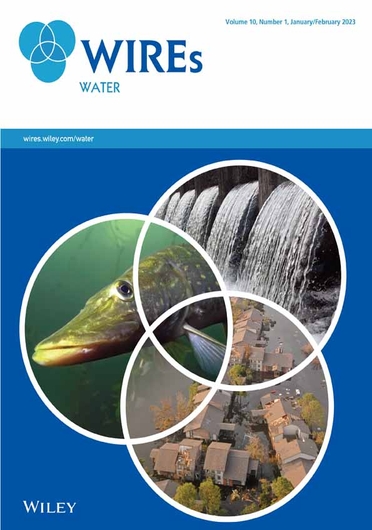Farmer‐led irrigation development in sub‐Saharan Africa
IF 5.8
1区 地球科学
Q1 ENVIRONMENTAL SCIENCES
引用次数: 2
Abstract
Farmer‐led irrigation development (FLID) is a process where individual farmers play a driving role in configuring agricultural technology practices, crop‐specific market linkages, land and water governance arrangements, and informal and formal value chain actor networks. Multilateral donors are increasingly funding FLID as a development strategy in sub‐Saharan Africa to expand irrigation coverage, recognizing co‐benefits such as enhanced climate resilience, improved household food insecurity, and alleviated rural poverty. This review suggests that FLID can be understood as a farmer response to the shortcomings of neoliberal structural adjustment and cost recovery policies. Simultaneously, multilateral donor‐funded FLID projects advance Integrated Water Resource Management (IWRM) policy tools, exposing a policy paradox. Following multilateral and bilateral donor investments in FLID over 30 years, the review establishes how farmers initiated their own irrigation investments and the subsequent “scale‐up” of FLID by multilateral finance institutions. The stances of multilateral donors (e.g., World Bank) and multilateral entities (e.g., FAO) toward water governance for FLID present a contradictory picture. The review demonstrates how multilateral donors have transformed FLID into distinct agribusiness project models through Water‐Energy‐Food nexus and climate frameworks, with attention to farmers' collective action strategies. However, collective action as an avenue for the expansion of FLID does not automatically guarantee a socially inclusive and environmentally sustainable process across project models. Future research should focus on examining socioeconomic impacts on farmers participating in a project intervention, as well as farmers and irrigated value chain actors in proximal areas, to work toward effective and equitable water governance for FLID.撒哈拉以南非洲农民主导的灌溉发展
农民主导的灌溉发展(FLID)是一个过程,在此过程中,农民个人在配置农业技术实践、特定作物的市场联系、土地和水治理安排以及非正式和正式的价值链行动者网络方面发挥驱动作用。多边捐助方正越来越多地向撒哈拉以南非洲地区提供资金,将其作为扩大灌溉覆盖范围的一项发展战略,认识到增强气候适应能力、改善家庭粮食不安全状况和减轻农村贫困等共同效益。这篇综述表明,FLID可以被理解为农民对新自由主义结构调整和成本回收政策缺点的回应。同时,多边捐助者资助的FLID项目推进了综合水资源管理(IWRM)的政策工具,暴露了一个政策悖论。在30多年来多边和双边捐助者对国际农业发展基金的投资之后,本报告确定了农民如何启动他们自己的灌溉投资,以及随后多边金融机构如何“扩大”国际农业发展基金的规模。多边捐助者(例如,世界银行)和多边实体(例如,粮农组织)对发展中国家水资源管理的立场是相互矛盾的。该综述展示了多边捐助者如何通过水-能源-粮食关系和气候框架,将FLID转变为独特的农业综合企业项目模式,并关注农民的集体行动战略。然而,集体行动作为扩大FLID的途径并不能自动保证跨项目模式的社会包容性和环境可持续性进程。未来的研究应侧重于研究对参与项目干预的农民以及邻近地区的农民和灌溉价值链参与者的社会经济影响,以努力实现有效和公平的FLID水治理。
本文章由计算机程序翻译,如有差异,请以英文原文为准。
求助全文
约1分钟内获得全文
求助全文
来源期刊

Wiley Interdisciplinary Reviews: Water
Environmental Science-Ecology
CiteScore
16.60
自引率
3.70%
发文量
56
期刊介绍:
The WIREs series is truly unique, blending the best aspects of encyclopedic reference works and review journals into a dynamic online format. These remarkable resources foster a research culture that transcends disciplinary boundaries, all while upholding the utmost scientific and presentation excellence. However, they go beyond traditional publications and are, in essence, ever-evolving databases of the latest cutting-edge reviews.
 求助内容:
求助内容: 应助结果提醒方式:
应助结果提醒方式:


